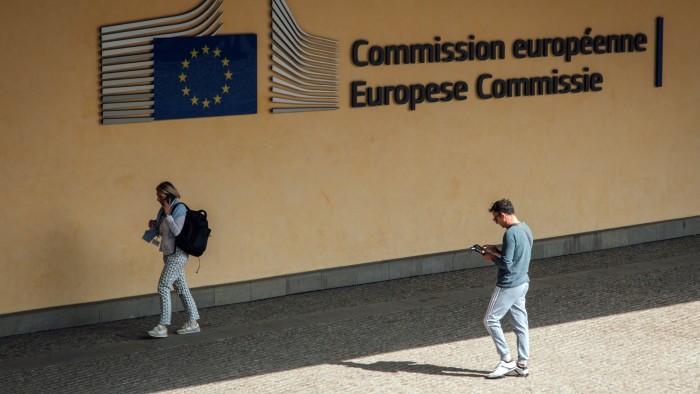Unlock the Editor’s Digest for free
Roula Khalaf, Editor of the FT, selects her favourite stories in this weekly newsletter.
The chief executives of large European companies including Airbus and BNP Paribas have urged Brussels to halt its landmark artificial intelligence act, as the EU considers watering down key elements of the law due to come into force in August.
In an open letter, seen by the Financial Times, the heads of 44 major firms on the continent called on European Commission President Ursula von der Leyen to introduce a two-year pause, warning that unclear and overlapping regulations are threatening the bloc’s competitiveness in the global AI race.
The letter said that the EU’s complex rules puts “Europe’s AI ambitions at risk, as it jeopardises not only the development of European champions, but also the ability of all industries to deploy AI at the scale required by global competition.” Co-signatories also included the chiefs of French retailer Carrefour and Dutch healthcare group Philips.
The EU has faced intense pressure from the US government and Big Tech as well as European groups over its AI Act, considered the world’s strictest regime regulating the development of the fast-developing technology.
The latest lobbying effort comes as Brussels held a crunch meeting with big US tech groups on Wednesday to discuss a new softened draft of its regulations.
The current debate surrounds the drafting of a “code of practice”, which will provide guidance to AI companies on how to implement the act that applies to powerful AI models such as Google’s Gemini, Meta’s Llama and OpenAI’s GPT-4. Brussels has already delayed publishing the code, which was due in May, and is now expected to water down the rules.
The EU’s tech chief Henna Virkkunen on Monday said Brussels is finalising the code of practice ahead of the August deadline. “We will publish the code of practice before that to support our industry and SMEs to comply with our AI Act”.
Officials within the European Commission and in different European countries have been privately discussing streamlining the complicated timeline of the AI Act. While the legislation entered into force in August last year, many of its provisions only come into effect in the upcoming years.
“This is a classic example of regulitis that doesn’t take into account the most important thing for industry, which is legal certainty”, said Patrick Van Eecke, co-chair of law firm Cooley’s global cyber, data and privacy practice.
The letter from CEOs, which was organised by the EU AI Champions Initiative — a body representing 110 companies on the continent across industries — said a postponement would send “innovators and investors around the world a strong signal that Europe is serious about its simplification and competitiveness agenda.”
European tech entrepreneurs — and the venture capitalists who back them — have also criticised the AI Act. A separate joint letter signed by more than 30 European AI start-up founders and investors this week called the legislation “a rushed ticking time bomb”.
Start-up founders are particularly worried about a lack of clarity about how general-purpose AI models will be regulated, fearing a patchwork of different rules in different member states that will be easier for deep-pocketed US Big Tech companies to navigate than smaller local businesses.
A wide range of European businesses have expressed fears that the AI Act will make companies who use or incorporate large language models into their own IT systems responsible for the same regulatory requirements as Big Tech companies in contentious areas such as copyright liability.
Some companies also fear that uncertainty about how the rules will be implemented by the member states may deter companies from deploying AI systems, potentially putting them at a disadvantage to rivals in the US or China.
The European Commission said it is “fully committed to the main goals of the AI Act, which include establishing harmonised risk-based rules across the EU and ensuring the safety of AI systems on the European market”
But it added the bloc is working on an upcoming simplification of its digital rules, so “all options remain open for consideration at this stage.”
